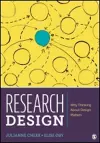
Research Design
2 authors - Paperback
£84.00
Julianne Cheek is a professor at ∅stfold University College, Norway. She is editor in chief of Qualitative Health Research, as well as being an editorial board member of a number of journals related to qualitative inquiry. Her publications reflect her ongoing interest in qualitative inquiry and the politics of that inquiry. In 2010-2012, she had the honor of serving as the vice president of the International Association of Qualitative Inquiry and currently serves on the External Advisory Board of the International Congress of Qualitative Inquiry, held annually at the University of Illinois. She has a long term interest in the teaching and development of courses in research design and methods - at Masters, Doctoral, and Post-Doctoral levels. Julianne has formal qualifications in teaching and education and began her working life teaching science in secondary schools. After completing her PhD in social sciences she took up her first academic post teaching nursing students. Since then she has taught research methods to students in a number of health related areas including physiotherapy, nutrition and sport sciences, as well as students in leadership and organizational studies. She has held senior administrative university posts at a number of universities, including Dean of Graduate Studies. Director of Early Career Development, and Dean Research. Elise ∅by is an associate professor at Kristiania University College, Norway. She holds a PhD in mathematics and a master’s degree in organization and leadership. Her Masters study employed qualitative research. She has held academic positions in multiple universities and colleges in Norway. She has also worked in public administration and held a management position at a university college. She started her academic career teaching mathematics and statistics across a variety of study programs including teacher education, finance, and business administration. Her teaching experience also includes courses in mathematics and physics taken by engineering students. In engineering, statistics (and therefore mathematics) are considered a tool more than the issue of interest in itself. Using mathematics and statistics as tools to learn about how the world works and how to make decisions based on empirical data collected from and about that world, rather than as procedures to solve constructed mathematical/statistical problems, sparked her interest in the field of research design and research methods in the social sciences. Her current teaching includes courses in research design, quantitative methods, and qualitative methods. She has an interest in enabling students and researchers to design research in such a way that the findings from that research is credible, reliable, trustworthy, and defensible.